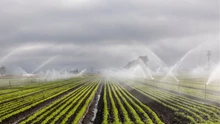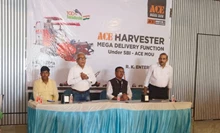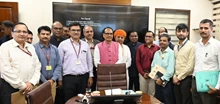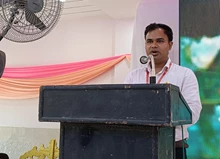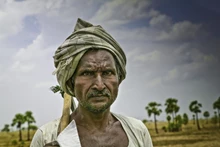
The lowdown on what the global leaders from the seed industry had to say at the recently concluded ISF WSC 2024!

Luminaries like Laurel Carter, Head of Phytosanitary and Seed Movement Compliance at Syngenta highlighted the global nature of the seed industry, stating, "Seed production occurs worldwide to optimize quality and yield. After harvest, seeds often undergo processing in specialized facilities across different countries to ensure maximum quality before treatment."
“We are proud to share in this special occasion with ISF to co-host the centennial World Seed Congress. The Netherlands is a natural home of the seed sector. Its globally traded innovation embedded in seeds contributes significantly to a number of Sustainable Development Goals. We are excited to build further on this into the future and drive forward a more productive and robust food system,” said Niels Louwaars, Managing Director of Plantum.
Christine Hazel, Global Regulatory Lead - Seed Applied Technologies at Corteva Agriscience emphasized the importance of seed treatment products in protecting seeds from diseases and environmental stresses, noting the precision application process, and the role of regulatory authorities in supporting sustainable agriculture.
Dale Krolikowski, Head of Business Development and Research at Germains Seed Technology, explained, “Biostimulants, often derived from seaweed, aid in early root and plant development, helping plants overcome climate changes, abiotic stress, and drought tolerance.”
Paul van den Wijngaard, Head of Research & Development - Europe at Germains Seed Technology, stated, "Many new products in the market help crops cope with abiotic stress. Our focus is on developing dedicated seed treatment solutions tailored to specific crops to address these challenges effectively."
Dan Jenkins, VP of Regulatory and Government Affairs at Pairwise, said, "We are using gene-editing to improve food and vegetables, harnessing it to benefit consumers, farmers, and the environment."
Arend Streng, Patent Specialist at Rijk Zwaan, added, "We are focusing on many crops, but initially we are concentrating on a few to determine whether gene editing can be efficiently applied to them."
Claudia Hallebach, LLM, Head of Global IP at KWS Group, remarked, "We see significant potential in new genomic techniques across all our crops. To support sustainable agriculture, we need to develop trade in all our crops, especially corn, sugar beet, cereals, and sunflower, with traits like fungal resistance and pest resistance for food security."

Alwin Kopse, Chair of the 11th Governing Body International Treaty on Plant Genetic Resources for Food and Agriculture, highlighted the significance of the discussion on Digital Sequence Information (DSI) within the multilateral governance framework. He noted, "Our world is somewhat divided, and for the past 20 years, we've focused on understanding the benefits of Access and Benefit-Sharing (ABS) for genetic materials, developing the necessary roles. Concurrently, as technology progresses, we are now exploring how to adapt the legal framework accordingly. This is crucial for several reasons, including addressing the climate crisis and ensuring robust legal regulations. People adhere to rules because they trust them, making it essential not to overlook ABS. It's a critical consideration, and we must proceed with conscious intent."
Kim Van Seeters, Senior Policy Officer at the Dutch Ministry of Agriculture, Nature, and Food Quality, stated, "The Convention on Biological Diversity (CBD) was established in 1992. Since then, rapid technological advancements in life sciences and the use of genomic information have increased, leading to expanded research and innovation. This expansion includes the potential addition of genomic information to physical genetic resources. Consequently, discussions have begun on whether the use of genomic information should be subject to Access and Benefit-Sharing (ABS) obligations. Concerns have arisen regarding the Nagoya Protocol contracts, specifically that a bilateral approach may result in reduced benefit-sharing from the use of genetic resources and potential loopholes."
Jasmina Muminovic (Susic), Chair of the ABS Task Force at the International Chamber of Commerce stated, "There is no clear definition for Digital Sequence Information. We can discuss genetic sequences such as DNA, RNA, and protein structures. Apart from being a highly technical issue, it is also a significant political discussion. We need to find solutions to address political challenges between the global south and north. There are potential loopholes in the current system, which is designed around physical genetic material, that hinder benefit sharing."
Lucy Chioma Aniagolu, Founder of Agrodemy Technologies and NGIN Ambassador, noted, "Africa holds 60 percent of the world's arable land, yet remains one of the most food-insecure regions due to post-harvest loss. This conversation is vital for me as a young person. Technology like AI enables youth to apply their knowledge and experience in the field."
Klaus Berend, Director of DG Health and Food Safety at the EU Commission, emphasized the EU seed sector's dynamism, innovation focus, and international trade. He highlighted the stringent regulations governing seed production and marketing in Europe, including certification for identity and quality, registration in the EU common catalog, and adherence to plant health requirements established by WTO rules. Currently, over 44,000 varieties of agricultural and vegetable species are registered for marketing across the European Union, with imported certified seeds permitted based on equivalence decisions granted to third countries following legislative analysis.

Rob Gaffney, Director of Global Marketing Seed Treatment at BASF, stated, "Our role is to introduce products to the market that empower the seed industry and help growers cultivate high-quality, productive crops that help feed the world. We ensure these products adhere to sustainable practices, including efforts to reduce microplastics in seed treatments. The seed industry needs time to become microplastic-free, and all stakeholders—seed suppliers, policymakers, and NGOs—should collaborate to address the issue of microplastics in seed treatments."
Olalekan Akinbo, Technical Lead of the Genome Editing Program at the African Union Development Agency – NEPAD (AUDA-NEPAD), highlighted Africa's engagement with genome editing, extending beyond crops to include livestock.
Krista Thomas, VP of Trade Policy and Seed Innovation at the Canadian Grain Council, emphasized the significance of international dynamics in the seed sector, expressing satisfaction as Canada achieves full alignment with ISF regulations. She highlighted Canada's streamlined regulatory approach, stating that plants without foreign DNA no longer require specific regulation. Additionally, she underscored the importance of transparency in the value chain, noting the implementation of a new mechanism in Canada to ensure farmers have clarity when purchasing seeds, regarding whether they are gene-edited or not.
Rob Pronk, Global Marketing Manager at Incotec, stated, "We specialize in enhancing seed quality through advanced seed technology. Our goal is to help the seed industry eliminate microplastics in a sustainable manner as quickly as possible." Defining microplastics, he explained, "Microplastics are tiny synthetic polymers that are insoluble in water and do not degrade." He emphasized the importance of proper seed treatment, saying, "Farmers play a crucial role in applying seed treatment products correctly. It is essential to ensure that microplastics are removed during the seed treatment process to protect both farmers and the environment."
Bert Compaan, Research Manager at BEJO Zaden, stated, "We are conducting research on seed coating and seed testing, recognizing our responsibility to maintain seed health, which directly impacts plant, human, and environmental health."

Andreas Lankow, Agricultural Solutions Portfolio Head at Syngenta, shared, “I’m addicted to data, and people know I spend a lot of time utilizing it. My journey began in a warehouse packing bags of seeds. In today's AI-driven era, data is paramount. In agriculture, it's the data we capture from farms that matters most.”
Lankow elaborated, “Syngenta has numerous trial locations worldwide where we test products in various environments and management practices across Europe. We capture the performance of our products not just in isolation but aim to understand how they perform under different stress conditions, climatic conditions, and soil textures. We digitalize all these trials, calling them geo-referenced on-farm trials. We gather extensive data layers, starting with soil testing technologies to understand soil textures and attributes, and then using drones to capture even more farm data.”
"Technology is evolving faster than growers can adapt to it. Growers need to understand the benefits of technology in their fields first. Syngenta plays a critical role in helping growers onboard this technology by demonstrating its value," said Lankow. Discussing Large Language Models (LLM), he added, "At Syngenta, we are integrating LLMs with digital twins of our products. These models interact with big data, providing growers with simple, actionable advice. AI helps us consolidate all data and expertise, making it easily accessible to growers. This is the direction we are heading, simplifying data collection and access with LLMs."
Morgan Nzwere of Seed Co Zimbabwe spoke about his company's efforts, stating, "At Seed Co, we develop, breed, and supply certified seed species, focusing on hybrid maize, wheat, soybeans, beans, rice, potatoes, sorghum, cotton, and vegetables. Our business model prioritizes research, enabling us to create new varieties that tackle the challenges farmers face, such as climate change, shifting rainfall patterns, and the need for affordable, improved seed varieties."
Bas Gorissen, Global Program Manager at BASF- Nunhems, highlighted their commitment to sustainability through various projects. Collaborating with research efforts in production areas across Maharashtra and Karnataka for vegetable seeds, they engage with the entire supply chain, including growers, laborers, seed companies, labor organizations, schools, and communities. Their aim is to understand root causes and enact positive change.

Andrew Mushita, Community Technology Development Trust Zimbabwe, highlighted the importance of supporting the complementarity between farmer seed systems and the seed sector. "Instead of polarizing this area, we need to identify opportunities for collaboration and cooperation, pinpoint gaps on both sides and find common solutions. On a global scale, we recognize that smallholder farmers are predominant. These farmers depend on agriculture, and we must support them to enhance their productivity,"Mushita stated.
"It's time to focus on farmer-led agricultural research because farmers know best what they need and what is ecologically adaptive in their own conditions and situations. We need to move towards agricultural research that is farmer-driven,” he added.

Courtney Davies, NGIN Ambassador, New Zealand, delved into the multifaceted concept of environmental sustainability, emphasizing key components such as Environmental, Social, and Governance (ESG) criteria, Carbon Credits, and offsetting strategies. Davies shed light on the importance of integrating these practices into business models to mitigate environmental impact, promote social responsibility, and ensure long-term viability. By exploring innovative approaches like carbon offsetting, she underscored the significance of proactive measures in addressing climate change and fostering a sustainable future for generations to come.
Kanokwan 'May' Chodchoey, Group Head of Public Affairs at East-West Seed, emphasized the company's pivotal role in developing and enhancing tropical vegetable varieties tailored to tropical markets and growing conditions. Their mission focuses on providing innovative products and services to uplift the livelihoods of vegetable farmers. Additionally, East-West Seed is dedicated to empowering vegetable farmers through training initiatives aimed at maximizing yield and income through improved knowledge and farming skills.
Addressing the global issue of child labor, Chodchoey informed that 70 percent of affected children are involved in the agricultural sector due to financial constraints preventing their access to education. In response, the company conducted thorough studies and investigations into school facilities, leading to initiatives aimed at improving school environments to ensure children's happiness and well-being. These efforts involve raising awareness among farmers and collaborating with activists to address this pressing issue.
Moreover, Sandra Claassens, Director of the Arisa Foundation, highlighted the organization's mission to enhance respect for human and labor rights within global supply chains. Collaborating with civil society partners across India, Bangladesh, Pakistan, and other nations, Arisa sheds light on human rights and labor abuses in various industries, including garments, leather, natural stone, and vegetable seed production. Claassen emphasized the urgency of addressing not only child labor but also the critical issue of wages.

Khaoula Belhaj Fragniere, Regulatory Affairs Manager at ISF, highlighted the importance of building seed resilience to support sustainable food systems. She noted, "We need systems that can withstand geopolitical shifts, unpredictable weather conditions due to climate change, and potential supply chain disruptions from pandemics. At ISF, our Seed Resilience initiative is vital to our vision of providing high-quality seed choices to all farmers, ensuring no one is left behind.” Fragniere highlighted various ISF initiatives, such as global seed partnerships and Public-Private Partnerships with CGIAR, which aim to strengthen seed resilience.
Alon Haberfeld, Technology & Operation Manager of Fair Planet shared, "Our organization is dedicated to addressing the shortage of quality seeds for smallholder farmers in developing countries. By providing access to high-quality vegetable varieties tailored to these regions, we enable farmers to achieve substantial yields, enhancing food security and fostering economic growth. Through this initiative, seeds become a powerful and responsible tool for alleviating malnutrition, creating new opportunities, and improving quality of life. Looking ahead, we are excited to expand our efforts with additional partners next season."

Arthur Santosh Attavar, Vice President of ISF and Chairman & Managing Director of Indo-American Hybrid Seeds (India), discussed insights into the company's longstanding commitment to smallholder farmers in India. "Since the early 70s, we have been working with smallholder farmers, focusing on extension work to update outdated cultivation techniques," Attavar stated. "Our research-driven approach has produced a variety of products such as hot pepper, sweet pepper, and numerous others suited for tropical and subtropical regions."
Discussing seed resilience, Attavar added, "We develop products with high output per unit area to meet the needs of smallholder farmers who require higher yields and quality seeds. Currently, we are trialling our products with several partners and are seeing promising results. We will soon compile and publish these findings, which will significantly improve the situation for smallholder farmers."
Namuhoranye Innocent, President of the National Seed Association of Rwanda, highlighted the importance of partnerships in his address. “We are collaborating with both local and international organizations to align our efforts and achieve common goals. Our focus is on improving the lives of Rwandan farmers, enabling them to earn more profits from their produce. It is essential that local and international laws foster a common understanding to facilitate market expansion,” he stated. Innocent concluded by highlighting the significance of long-term sustainability, stressing that it is crucial for securing a better future for everyone.
Johannes D. (J.D.) Rossouw, SVP & Head, Vegetable Research and Development, Bayer, said "Biotechnology offers benefits for both public and private seed companies in addressing growers' challenges. Bridging scientific advancements with public understanding and technology endorsement is critical."
As per Leonardo Costa, EMEA Seed Applied Technologies-Lead, Corteva Agriscience, "Seed Applied Technologies provide superior protection for crops from the very beginning, enhancing productivity and profitability to achieve a successful harvest. Today’s farmers face numerous challenges in producing abundant, healthy crops, and seed treatments are a crucial tool for enabling more sustainable and economical farming. These treatments ensure seeds have the best start to becoming healthy plants that reach their full genetic potential. In the past, we discussed fungicides and insecticides, but today, the focus is on making production more sustainable and protecting crop value. We remain committed to investing in new technologies aimed at boosting yields, enhancing livelihoods, and ensuring long-term food security."
Ebunoluwa Ajobiewe, Co-Chair of NGIN expressed, "Science communication in biotechnology is essential for achieving a prosperous and sustainable future. Better public understanding is crucial. Partnering with and supporting initiatives like NGIN and Science2Seed can help in this endeavor."
In an era marked by the challenges of climate change, food security, and rapid technological progress, the pivotal role of the seed industry in forging a sustainable and resilient future has become increasingly evident.








